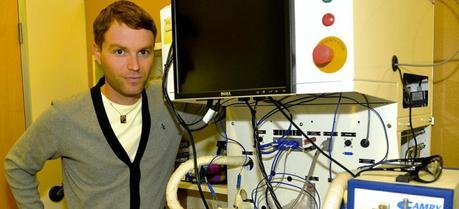 Erik Kjeang, director of SFU's Fuel Cell Research Lab, is the principal investigator of a research project in which scientists will be able to "see" directly inside fuel cells. (Credit: Simon Fraser University)
Erik Kjeang, director of SFU's Fuel Cell Research Lab, is the principal investigator of a research project in which scientists will be able to "see" directly inside fuel cells. (Credit: Simon Fraser University)X-ray imaging is useful not only for studying lithium-ion batteries, but also to develop and advance the technology for the next generation of more durable, lower-cost fuel cells. Powerful scanners that give scientists a direct line of sight into hydrogen fuel cells are the latest tools Simon Fraser University scientists will use in their research.
The new Nano X-ray Computed Tomography (NXCT) tools will become part of a fuel cell testing and characterization facility. The new four-year, $6.5 million project is receiving $3.39 million in funding from Automotive Partnership Canada (APC).
Research carried out in the new visualization facility, expected to be operational by spring, will further the ongoing research collaboration between Ballard Power Systems Inc and SFU.
“With this project, we’ll be able to take an operating fuel cell, put it into this instrument, image it, and then put it back, and be able to do this periodically throughout its lifetime, so we can see how the structure changes,” says Ballard’s Research Manager Shanna Knights. “We can then use the knowledge gained to come up with improved designs, manufacturing processes, operating conditions and other strategies to produce a more durable, better performing and lower cost fuel cell for buses and our other market segments like materials handling, and backup power systems.”
Kjeang, an assistant professor in SFU’s School of Mechatronic Systems Engineering, says the new, sophisticated nano-scale scanning capabilities will enable researchers to see inside the fuel cell micro-structure and track how its components degrade over time. The research will play an important role in the university’s focus on advancing clean energy initiatives.
Ballard Power Systems has teamed up with SFU researcher Dr. Erik Kjeang on two complementary Automotive Partnership Canada (APC) projects to enhance the durability and reliability of heavy duty bus fuel cells. Kjeang, who got his start in 2008 as a research engineer at Ballard, is now one of the world’s leading experts on fuel cells. He describes the skills he honed in industry as “absolutely essential for the productivity and success of both APC projects.”

